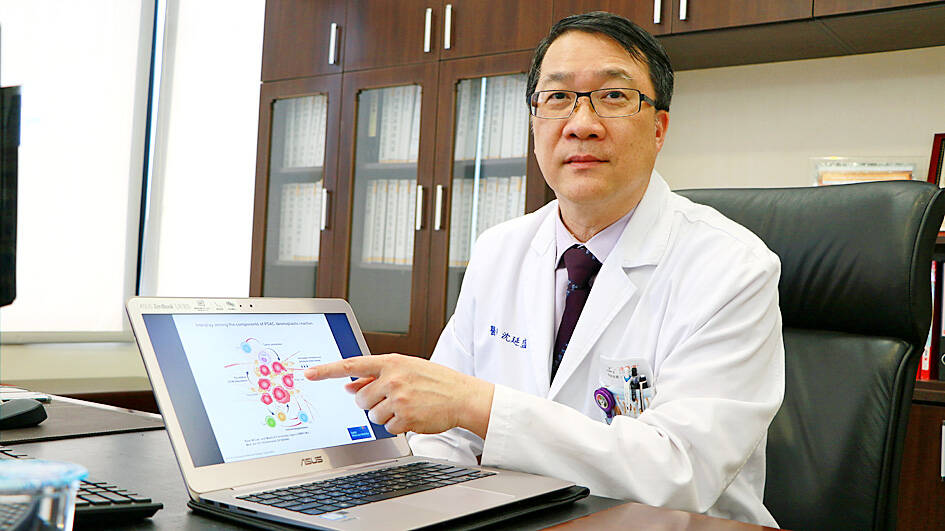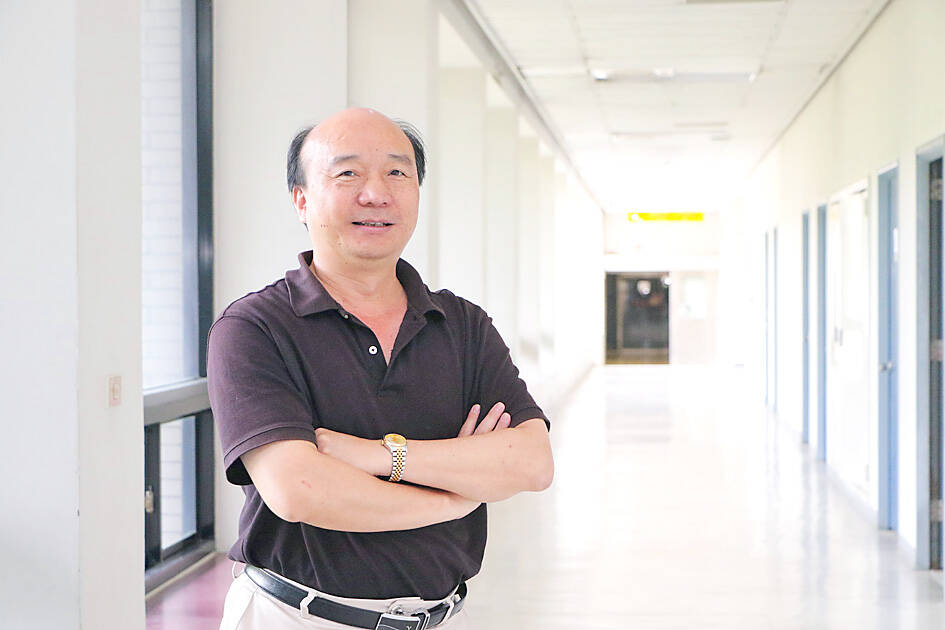Researchers from National Chung Cheng University (CCU) and National Cheng Kung University (NCKU) have identified a novel signaling mechanism in pancreatic cancer patients, knowledge of which might help improve survival rates for the deadly disease.
The newly-discovered TIMP1-CD63 signaling mechanism causes Kirsten rat sarcoma viral oncogene homologue (KRAS)-mutated cells found in about 90 percent of pancreatic cancer patients to evade destruction by the immune system, the CCU and NCKU said last week.
The researchers found that a gene deficiency known as dual specificity phosphatase-2 (DUSP2) helps KRAS-mutated cells continue growing.

Photo: Screen grab from National Cheng Kung University’s Web site
The interaction of those factors results in a “vicious cycle” that promotes the progression of pancreatic cancer, which has a survival rate of less than 10 percent, the researchers said.
“Disruption of the vicious cycle ... may be a highly potential way to inhibit pancreatic cancer progression,” the researchers said.
Led by CCU Department of Physiology chair professor Tsai Shaw-jenq (蔡少正) and NCKU College of Medicine dean Shan Yan-shen (沈延盛), the research team published their findings in the scientific journal Molecular Cancer last month.

Photo: Screen grab from National Cheng Kung University’s Web site
The paper, titled “Intercellular TIMP-1-CD63 signaling directs the evolution of immune escape and metastasis in KRAS-mutated pancreatic cancer cells,” was based on in vitro and in vivo experiments on mice, as well as spatial transcriptomic analysis of tumors.
“Understanding interactions between various cells in pancreatic cancer tumor micro-environments is of great significance for developing blocking strategies, improving early diagnosis rates and improving patient prognoses,” Shan said.
The research supports the view that chronic inflammation is a major factor in cancer progression, because it draws a large presence of macrophages — large immune system cells that digest pathogens.
Based on the interaction of active TIMP-1-CD63 signaling and low DUSP2, the presence of macrophages triggered the “vicious cycle” of tumor growth and might actually play a role in sustaining tumor progression, researchers said.
The research was primarily funded by Taiwan’s National Science and Technology Council and National Health Research Institutes.

Taiwan has received more than US$70 million in royalties as of the end of last year from developing the F-16V jet as countries worldwide purchase or upgrade to this popular model, government and military officials said on Saturday. Taiwan funded the development of the F-16V jet and ended up the sole investor as other countries withdrew from the program. Now the F-16V is increasingly popular and countries must pay Taiwan a percentage in royalties when they purchase new F-16V aircraft or upgrade older F-16 models. The next five years are expected to be the peak for these royalties, with Taiwan potentially earning

STAY IN YOUR LANE: As the US and Israel attack Iran, the ministry has warned China not to overstep by including Taiwanese citizens in its evacuation orders The Ministry of Foreign Affairs (MOFA) yesterday rebuked a statement by China’s embassy in Israel that it would evacuate Taiwanese holders of Chinese travel documents from Israel amid the latter’s escalating conflict with Iran. Tensions have risen across the Middle East in the wake of US and Israeli airstrikes on Iran beginning Saturday. China subsequently issued an evacuation notice for its citizens. In a news release, the Chinese embassy in Israel said holders of “Taiwan compatriot permits (台胞證)” issued to Taiwanese nationals by Chinese authorities for travel to China — could register for evacuation to Egypt. In Taipei, the ministry yesterday said Taiwan

‘LIKE-MINDED PARTNER’: Tako van Popta said it would be inappropriate to delay signing the deal with Taiwan because of China, adding he would promote the issue Canadian senators have stressed Taiwan’s importance for international trade and expressed enthusiasm for ensuring the Taiwan-Canada trade cooperation framework agreement is implemented this year. Representative to Canada Harry Tseng (曾厚仁) in an interview with the Central News Agency (CNA) said he was increasingly uneasy about Ottawa’s delays in signing the agreement, especially as Ottawa has warmed toward Beijing. There are “no negotiations left. Not only [is it] initialed, we have three versions of the text ready: English, French and Mandarin,” Tseng said. “That tells you how close we are to the final signature.” Tseng said that he hoped Canadian Prime Minister Mark Carney

POSITIVE DEVELOPMENT: Japan and the US are expected to hold in-depth discussions on Taiwan-related issues during the meeting next month, Japanese sources said The holding of a Japan-US leaders’ meeting ahead of US President Donald Trump’s visit to China is positive news for Taiwan, former Japan-Taiwan Exchange Association representative Hiroyasu Izumi said yesterday. After the Liberal Democratic Party’s landslide victory in Japan’s House of Representatives election, Japanese Prime Minister Sanae Takaichi is scheduled to visit the US next month, where she is to meet with Trump ahead of the US president’s planned visit to China from March 31 to April 2 for a meeting with Chinese President Xi Jinping (習近平). Japan and the US are expected to hold in-depth discussions on Taiwan-related issues during the